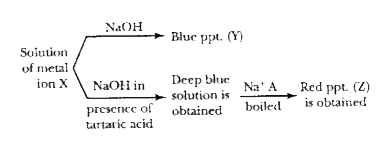AsF5 reacts with XeF4 to form an adduct. The shapes of cation and anion in the adduct are respectively.
square planar, octahedral
T-shaped, octahedral
square pyramidal, octahedral
square planar, trigonal bipyramidal
The correct Answer is:B
To determine the shapes of the cation and anion in the adduct formed from the reaction of AsF₅ and XeF₄, we can follow these steps:
Step 1: Identify the Products
When AsF₅ reacts with XeF₄, it forms an adduct consisting of a cation and an anion. The cation is XeF₃⁺ and the anion is AsF₆⁻.
Step 2: Analyze the Cation (XeF₃⁺)
1. Determine the Valence Electrons:
- Xenon (Xe) is in Group 18 and has 8 valence electrons.
- In XeF₃⁺, one electron is removed due to the positive charge, leaving 7 valence electrons.
2. Count the Bonds:
- There are 3 fluorine atoms bonded to xenon, contributing 3 bonding pairs.
3. Calculate Lone Pairs:
- Total electrons = 7 (from Xe) + 3 (from F) = 10 electrons.
- Each bond uses 2 electrons, so 3 bonds use 6 electrons, leaving 4 electrons.
- These 4 electrons form 2 lone pairs.
4. Determine the Steric Number:
- Steric number = Number of bonding pairs + Number of lone pairs = 3 (bonds) + 2 (lone pairs) = 5.
5. Determine Hybridization and Geometry:
- The hybridization corresponding to a steric number of 5 is sp³d.
- The molecular geometry with 3 bonding pairs and 2 lone pairs is T-shaped.
Step 3: Analyze the Anion (AsF₆⁻)
1. Determine the Valence Electrons:
- Arsenic (As) is in Group 15 and has 5 valence electrons.
- In AsF₆⁻, there is an additional electron due to the negative charge, giving it a total of 6 valence electrons.
2. Count the Bonds:
- There are 6 fluorine atoms bonded to arsenic, contributing 6 bonding pairs.
3. Calculate Lone Pairs:
- Total electrons = 6 (from As) + 12 (from 6 F) = 18 electrons.
- Each bond uses 2 electrons, so 6 bonds use 12 electrons, leaving 6 electrons.
- Since all electrons are used in bonding, there are no lone pairs.
4. Determine the Steric Number:
- Steric number = Number of bonding pairs + Number of lone pairs = 6 (bonds) + 0 (lone pairs) = 6.
5. Determine Hybridization and Geometry:
- The hybridization corresponding to a steric number of 6 is sp³d².
- The molecular geometry with 6 bonding pairs and no lone pairs is octahedral.
Conclusion
The shapes of the cation (XeF₃⁺) and anion (AsF₆⁻) in the adduct are respectively T-shaped and octahedral.
When AsF₅ reacts with XeF₄, it forms an adduct consisting of a cation and an anion. The cation is XeF₃⁺ and the anion is AsF₆⁻.
1. Determine the Valence Electrons:
- Xenon (Xe) is in Group 18 and has 8 valence electrons.
- In XeF₃⁺, one electron is removed due to the positive charge, leaving 7 valence electrons.
- There are 3 fluorine atoms bonded to xenon, contributing 3 bonding pairs.
- Total electrons = 7 (from Xe) + 3 (from F) = 10 electrons.
- Each bond uses 2 electrons, so 3 bonds use 6 electrons, leaving 4 electrons.
- These 4 electrons form 2 lone pairs.
- Steric number = Number of bonding pairs + Number of lone pairs = 3 (bonds) + 2 (lone pairs) = 5.
- The hybridization corresponding to a steric number of 5 is sp³d.
- The molecular geometry with 3 bonding pairs and 2 lone pairs is T-shaped.
1. Determine the Valence Electrons:
- Arsenic (As) is in Group 15 and has 5 valence electrons.
- In AsF₆⁻, there is an additional electron due to the negative charge, giving it a total of 6 valence electrons.
- There are 6 fluorine atoms bonded to arsenic, contributing 6 bonding pairs.
- Total electrons = 6 (from As) + 12 (from 6 F) = 18 electrons.
- Each bond uses 2 electrons, so 6 bonds use 12 electrons, leaving 6 electrons.
- Since all electrons are used in bonding, there are no lone pairs.
- Steric number = Number of bonding pairs + Number of lone pairs = 6 (bonds) + 0 (lone pairs) = 6.
- The hybridization corresponding to a steric number of 6 is sp³d².
- The molecular geometry with 6 bonding pairs and no lone pairs is octahedral.
The shapes of the cation (XeF₃⁺) and anion (AsF₆⁻) in the adduct are respectively T-shaped and octahedral.
Topper's Solved these Questions
Similar Questions
Knowledge Check
SbF5 react with XeF4 to form an adduct. The shapes of cation and anion in the adduct are respectively:
ASquare planar, trigonal bipyramidalBT-shaped, octahedralCSquare pyramidal, octahedralDSquare planar, octahedralSbF5 reacts with XeF4 to form an adduct. The shapes of cation and anion in the adduct are respectively:
Asquare planar, trigonal bipyramidalBT-shaped, octahedralCsquare pyramidal, octahedralDsquare planar, octahedralSbF5 reacts with XeF4 to form an adduct. The shapes of cation and anion in the adduct are respectively :
Asquare planar , trigonal bipyramidalBT− shaped , octahedralCsquare pyramidal, octahedralDsquare planar, octahedral

